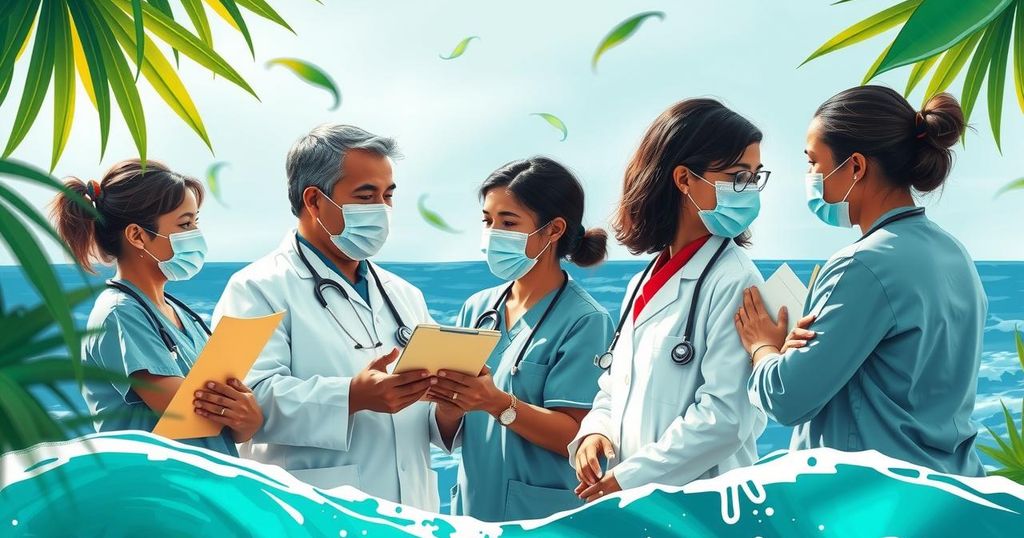Politics
” RUBIO, AFRICA, ANDREW HOLNESS, ASIA, DEMOCRACY, DICK, DICKON MITCHELL, DIPLOMATIC RELATIONS, DOMINICA, FOREIGN TRADE, HUMAN RIGHTS, INDIA, IR, IRFAAN ALI, KAM, KAMINA JOHNSON SMITH, MARCO RUBIO, NATIONAL SECURITY, NORTH AMERICA, OF, SOCIAL INTEGRATION, STABROEK, STABROEK NEWS, TRADE, TRUMP, UNITED STATES
Marcus Li
0 Comments
Cuban Medical Professionals: Caribbean Leaders React to US Visa Policy
The article discusses the U.S. expansion of visa restrictions targeting individuals linked to Cuba’s labor export program, particularly affecting overseas medical missions. Caribbean leaders have offered mixed responses, with several defending their partnerships with Cuba, highlighting the importance of Cuban medical professionals in regional healthcare systems. However, a collective CARICOM response remains absent, raising questions about the region’s foreign policy stance.
On February 25, Marco Rubio, Secretary of State of the United States, announced the expansion of a visa restriction policy pertaining to Cuba. This policy targets individuals associated with the Cuban labor export program, especially those involved in Cuba’s overseas medical missions. Rubio asserted that these programs enrich the Cuban regime while denying ordinary Cubans essential medical care, emphasizing the U.S. commitment to combating global forced labor practices.
In response to this announcement, Caribbean leaders have largely remained silent collectively three weeks later. Jamaican Prime Minister Andrew Holness has not publicly commented, while Foreign Affairs Minister Senator Kamina Johnson Smith expressed concern over the U.S. statement due to Jamaica’s longstanding involvement in the Cuban medical cooperation program. Guyana’s government has reached out to the U.S. for clarification regarding the policy’s implications.
Prime Ministers of Grenada and Dominica have been more vocal in defending their partnerships with Cuba. Grenada’s Prime Minister Dickon Mitchell emphasized the significance of this relationship, providing necessary medical support. Similarly, Dominica’s Prime Minister Roosevelt Skerritt stressed the importance of Cuban medical personnel for regional health systems and suggested a dialogue with U.S. officials to clarify the situation.
Leaders from Antigua and Barbuda, Trinidad and Tobago, Barbados, and St. Vincent and the Grenadines have delivered even stronger rebuttals. Prime Minister Gaston Browne of Antigua and Barbuda firmly rejected the claims of human trafficking linked to Cuban workers, arguing that punitive measures would dismantle healthcare services. Trinidad and Tobago’s Prime Minister, Keith Rowley, voiced discontent over accusations of exploitation while asserting the importance of their healthcare system reliant on foreign specialists.
On March 12, Barbados Prime Minister Mia Mottley clarified that cooperation with Cuban healthcare staff has been essential and described accusations of human trafficking as unfounded. She asserted that principles should not be compromised even against the threat of losing U.S. visas, emphasizing the life-saving contributions of Cuban professionals in the region. St. Vincent and the Grenadines’ Prime Minister Ralph Gonsalves underscored the practical necessity of Cuban medical assistance in his country, challenging the validity of U.S. claims.
Professor Sir Hilary Beckles from the University of the West Indies supported the Caribbean leadership’s stance, stating that the region will not be intimidated by U.S. pressures. CARICOM foreign ministers had planned discussions regarding the U.S. announcement, yet there remains an absence of a unified CARICOM statement on the matter.
Despite regional leaders articulating strong defenses, Jamaica’s Health Minister Dr. Christopher Tufton hinted at a contingency plan to replace Cuban medical staff, focusing on other nations for healthcare personnel. This raises questions about CARICOM’s collective foreign policy alignment regarding Cuban workers, as regional citizens and the diaspora seek clarity on the organization’s position.
In conclusion, the Caribbean response to the recent U.S. visa policy expansion regarding Cuban medical professionals has been varied, with some leaders strongly defending their partnerships with Cuba. While some Caribbean nations emphasize the significance of Cuban healthcare aid, others are cautiously moving towards alternative solutions in anticipation of potential repercussions. The lack of a unified stance from CARICOM raises questions regarding the organization’s foreign policy coordination and the prioritization of healthcare for the region’s citizens. Ultimately, the rhetoric and actions of Caribbean leaders signal a commitment to maintaining these critical health relationships, despite external pressures from the United States.
Original Source: www.stabroeknews.com




Post Comment